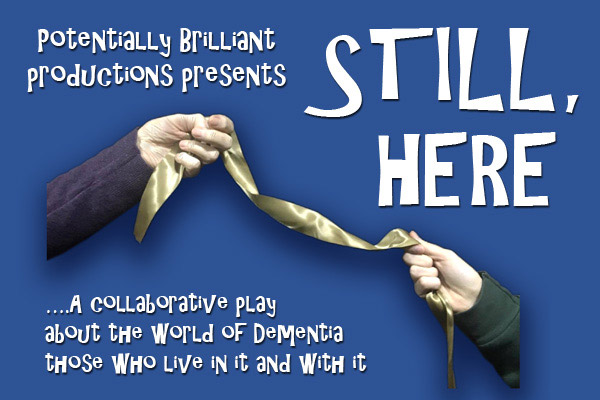Presented by Potentially Brilliant Productions
Directed by Mikyla Jane Durkan
The Casa, Liverpool
28th November 2016
Reviewed by Colin Serjent
This was a sobering but absorbing, and as you get older, thought-provoking stage performance of the effects of dementia on the sufferers themselves, as well as upon relatives, friends and social care workers.
All the seven person cast are non-actors, who all took part in the 12 week course, run by Potentially Brilliant Productions director Mikyla Jane Durkan, looking at different aspects of dementia.
All of those on stage wore black tops and trousers, symbolishing perhaps the darkness enveloping dementia patients and possibly because it is indiscriminate in who it affects.
Still Here opened with the recent announcement that Alzheimer’s Disease and other forms of dementia has become the leading cause of death in England and Wales for the first time. The mortality rate for dementia has more than doubled since 2010.
Symptoms of dementia include memory loss, difficulties with problem solving, use of language and the inability to process new information.
The knock-on effects of those grim statistics is that care workers, tending to dementia patients in their homes, are suffering stress-related illnesses. As was pointed out on stage the result of this is that the carers are becoming patients themselves.
Snatches of the song ‘Catch A Falling Star’ were then sung, evoking wistful memories of happier times for those afflicted by dementia.
“I don’t really know my name. I could be anyone,” uttered one character.
The difficulties care workers have to face when dealing with patients was shown when one of the patients refused to take the diagnosed medicine.
I ask the question: what is the care worker expected to do – force patients to ingest medicines against their will?
The other point is how effective or not are the medicines they do take?
Four telling comments were then made by both patients and relatives.
“Everything seems the same but different.”
“She has the same body but is now different”
“The disease is like a black cloud, ready to burst.”
“I don’t know who I am anymore.”
A pertinent point was raised when it was stated that nothing prepares the offspring in caring for their parent(s) with dementia.
A daughter, talking about her mum, said “You have to bring the light into dark places.”
An acoustic guitar piece, accompanied with vocals about the disease, was then played.
A monologue followed about particular biological effects of how the brain works.
When the disease kicks in “It is like a radio tuning in and out of channels.”
A poem was then recited about the past memories of dementia sufferers. Methinks to the song ‘Those Were The Days’ by Mary Hopkin.
The cast and capacity audience sang as one ‘You are my sunshine,’ relating to happier times.
A cast member, playing an elderly patient, informed us of about what he can get at his age, for instance, Winter Fuel Allowance, a free travel pass, a state pension, a lie-in in bed. “I can still protest and vote. I am living too long,”he said with a twinkle in his eye. “Am I lucky?”
A plaintive acoustic guitar solo was then performed, as if from a grandchild, which had the overriding sentiment “I love you grandad.”
Still Here ended poignantly with a refrain of ‘Catch a Falling Star.’
As a footnote, a tragic example of the debilitating effects of Alzheimer’s Disease was Bob Paisley, who died in 1996, who could not remember being manager of Liverpool FC. He was the most successful manager in their history, including his sides winning six league titles and three European Cups.
